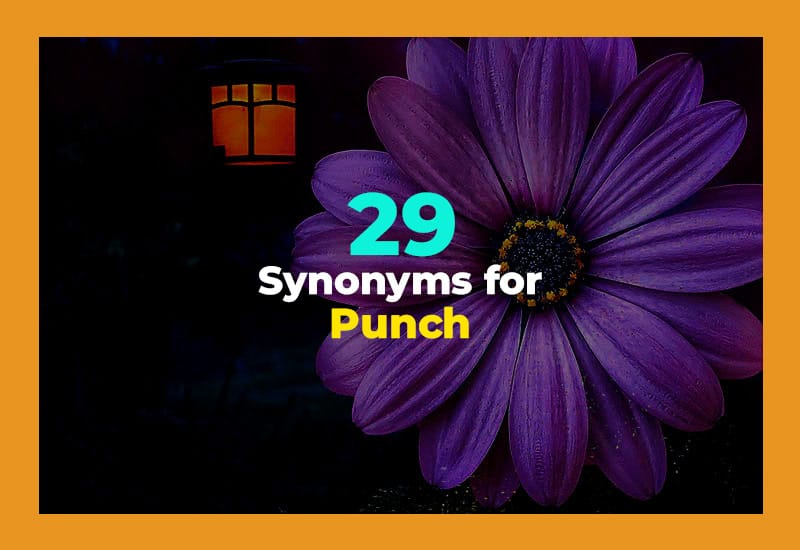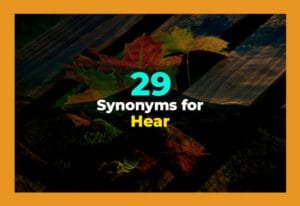You ever feel like saying ‘punch’ just isn't enough? Maybe you want something stronger, funnier, or just a little more fun to say. Whether you're talking about a fight in a movie, teasing your friend, or writing a cool action story, having more words for ‘punch’ can really level things up. Words like smack, slug, or bop can all bring different energy.
1. Hit
The word ‘hit’ is one of the most basic and common synonyms for ‘punch’. It means to strike something or someone quickly and with force. You can use it in many situations, from sports to action scenes. He hit the ball so hard, it flew over the fence! In a fight, if someone hits another person, it means they used their hand or fist. She hit him in the arm when he made a joke. It’s simple, direct, and easy to understand. ‘Hit’ works well for all kinds of punches—light or strong. It's one of the most universal words.
2. Strike
‘Strike’ means to hit someone or something with force. It’s a bit more formal than ‘hit’, but still easy to use. You often hear it in sports, boxing, or even military talk. The boxer struck his opponent with a strong right hand. You can strike with a fist, foot, or even a weapon. He struck the table with his fist when he got angry. It shows a strong, fast movement. ‘Strike’ can also be used in other ways, like ‘striking a deal’, but when it comes to fighting or action, it works well as a punch word.
3. Jab
A ‘jab’ is a quick, sharp punch, usually with your lead hand in boxing. It’s not as strong as other punches but is fast and useful. The boxer threw a jab to test his opponent's defense. In everyday talk, it can also mean a quick poke or light punch. He gave his friend a friendly jab in the ribs. It's short, snappy, and fun to say. Jabs are more about speed than power. If you're writing or talking about a fast punch that surprises someone, ‘jab’ is a great word to choose. It’s a favorite in boxing too.
4. Uppercut
An ‘uppercut’ is a special kind of punch that goes upward. It usually starts low and ends high, hitting the opponent's chin or jaw. This punch is common in boxing. He landed a powerful uppercut that knocked the other guy down. It's strong, dramatic, and hard to block. In real life, we use it more in storytelling or jokes. She gave him an uppercut for stealing the last cookie. It’s not used casually, but it makes any fight sound exciting. If you want to add some power and surprise to a scene, ‘uppercut’ is the punch you need.
5. Hook
A ‘hook’ is a punch that comes around from the side. It's strong, fast, and used a lot in boxing. He threw a left hook that caught the other guy off guard. Hooks can knock someone down if done right. They're great for close fights. She practiced her hook punches in the mirror every day. The word ‘hook’ can also mean to grab someone's attention, but in a fight, it means a curved punch to the side of someone's face or body. If you want your punch to feel powerful and tricky, go for a ‘hook’.
6. Blow
‘Blow’ means a hard hit or strike. It can be used for any kind of punch, kick, or hit. He took a blow to the stomach and fell back. It’s a strong word and often used in serious situations. The blow to his head made him dizzy. You might hear it in sports or news stories. It’s more formal but still common. When you say someone took a blow, it sounds dramatic and serious. It's a great word to use if you want to show a punch that really matters or does some real damage.
7. Sock
To ‘sock’ someone means to punch them, usually hard and suddenly. It’s informal and sounds funnier or more playful than ‘punch’. He socked his brother in the arm for teasing him. It's common in old cartoons and action stories. She socked the villain right in the face! While it can be used seriously, it often feels light or humorous. ‘Sock’ adds a playful twist to the idea of punching. If you’re writing a funny scene or a comic moment, this word works great. It's not used as much today, but it's still a fun word to know.
8. Slug
To ‘slug’ someone means to hit them very hard, usually with a closed fist. It's a strong, heavy punch. He slugged the guy and knocked him over. The word sounds tough, like something from an action movie or a tough guy story. After getting insulted, he slugged his rival without a second thought. It's not a light word—it shows real impact and anger. If you’re describing a fight that gets serious, ‘slug’ works well. It tells readers or listeners that the punch had weight behind it. It’s bold and strong, just like the action it describes.
9. Wallop
A ‘wallop’ is a powerful punch or hit. It sounds funny but means serious force. He gave the guy a wallop that sent him flying. The word is fun to say and often used when something hits hard—like a punch or even a strong taste. That chili had a spicy wallop! It's playful but still packs meaning. When someone gets walloped, they really feel it. It's not just for fighting either. You can use it for anything that hits hard. If you want to add humor and power to a sentence, ‘wallop’ is a great pick.
10. Whack
‘Whack’ means to hit something or someone quickly and forcefully. It can be with a hand, fist, or even an object. He whacked the ball across the field. In a fight, She whacked him across the face for lying. The word is fun and casual. It's often used in cartoons or casual speech. It also sounds like the noise a punch might make—’whack!’ It’s not super serious but still shows impact. You can whack someone playfully or in anger. Either way, it's easy to understand and adds sound to your story or description.
11. Bop
To ‘bop’ someone means to hit them, usually lightly or playfully. It's more about fun than real violence. He bopped his friend on the head with a pillow. Kids use it a lot, and it shows a silly, light hit. She bopped him on the nose during the game. It's not a serious punch word, but it's great for humor or playful scenes. If you’re writing something funny, ‘bop’ works perfectly. It's a cute and simple way to say ‘punch’ without sounding mean or violent. It makes the hit sound fun, not painful.
12. Smack
‘Smack’ means to hit someone or something with an open hand or with a loud sound. She smacked him on the arm for being rude. It's used in both serious and playful ways. The ball smacked against the wall. The word often adds sound to the action—it makes you imagine a loud, quick hit. It's easy to use and fits many situations. Whether it's a parent scolding a child or friends joking around, ‘smack’ is a punch word that people understand right away. It sounds real, quick, and clear. It's a fun, sharp word.
13. Clout
To ‘clout’ someone means to hit them, usually with force. It's a little old-fashioned but still strong. He clouted the thief and ran off. People use it more in the UK, but it works in all English. She clouted her brother on the head for stealing her snack. ‘Clout’ can also mean power or influence, but in a punch sense, it's about hitting hard. It sounds fancy and tough at the same time. Use it when you want to add a touch of drama or history to your punch. It's strong and stylish.
14. Belt
To ‘belt’ someone means to punch them really hard. He belted the bully with one strong swing. It's casual, often used in storytelling or tough talk. The word makes the punch sound like it hit with great power. She belted her opponent and won the fight. You might also hear ‘give him a belt’, which means to punch someone. It's not formal, but it's clear and bold. It tells people the punch was not light. It was big. If your scene needs a punch that feels huge and confident, ‘belt’ is the right choice.
15. Pop
To ‘pop’ someone means to hit them quickly, often in the face. He popped the guy in the nose before walking away. The word is short and snappy, like the sound of a punch. She popped her friend on the shoulder for scaring her. It's fast, light, and a bit playful. It can be used in jokes or serious scenes. The word adds sound and speed to the action. It's like a mini punch that still gets the job done. If you want a punch that feels quick and cheeky, ‘pop’ is a great word to use.
16. Crack
‘Crack’ means to hit someone hard, often making a loud noise. He cracked him on the jaw with a single punch. It's strong and dramatic. The word also works for things breaking, but in a fight, it means a punch that feels like something could snap. She cracked the guy with her elbow in defense. It sounds painful and fast. You can also say someone got ‘cracked up’, meaning hurt badly. If you want a punch that feels sharp, sudden, and powerful, ‘crack’ brings the noise and the drama with just one word.
17. Thump
A ‘thump’ is a deep, heavy hit. It can be with a fist or even a fall. He gave the table a hard thump in anger. In a fight, She thumped him in the chest and stormed off. The word is strong but not sharp—it feels slow and powerful. It's like a big sound or pressure. ‘Thump’ can also describe how your heart feels when you’re scared. If you’re writing a scene with a slow but serious punch, ‘thump’ adds the perfect feeling. It shows weight, not speed.

Final Thoughts
Punching isn't just about throwing fists—it's about how you talk about it too! Whether you’re writing a story, acting out a scene, or just goofing around, knowing fun and strong words like ‘slug’, ‘wallop’, or ‘smack’ can make everything more exciting. Each word brings its own style, sound, and feeling. Pick one that matches your mood or your scene, and you’ll sound more creative right away. These synonyms are easy, fun, and perfect for all kinds of uses. Keep them handy next time you want to say ‘punch’ without actually saying it.









